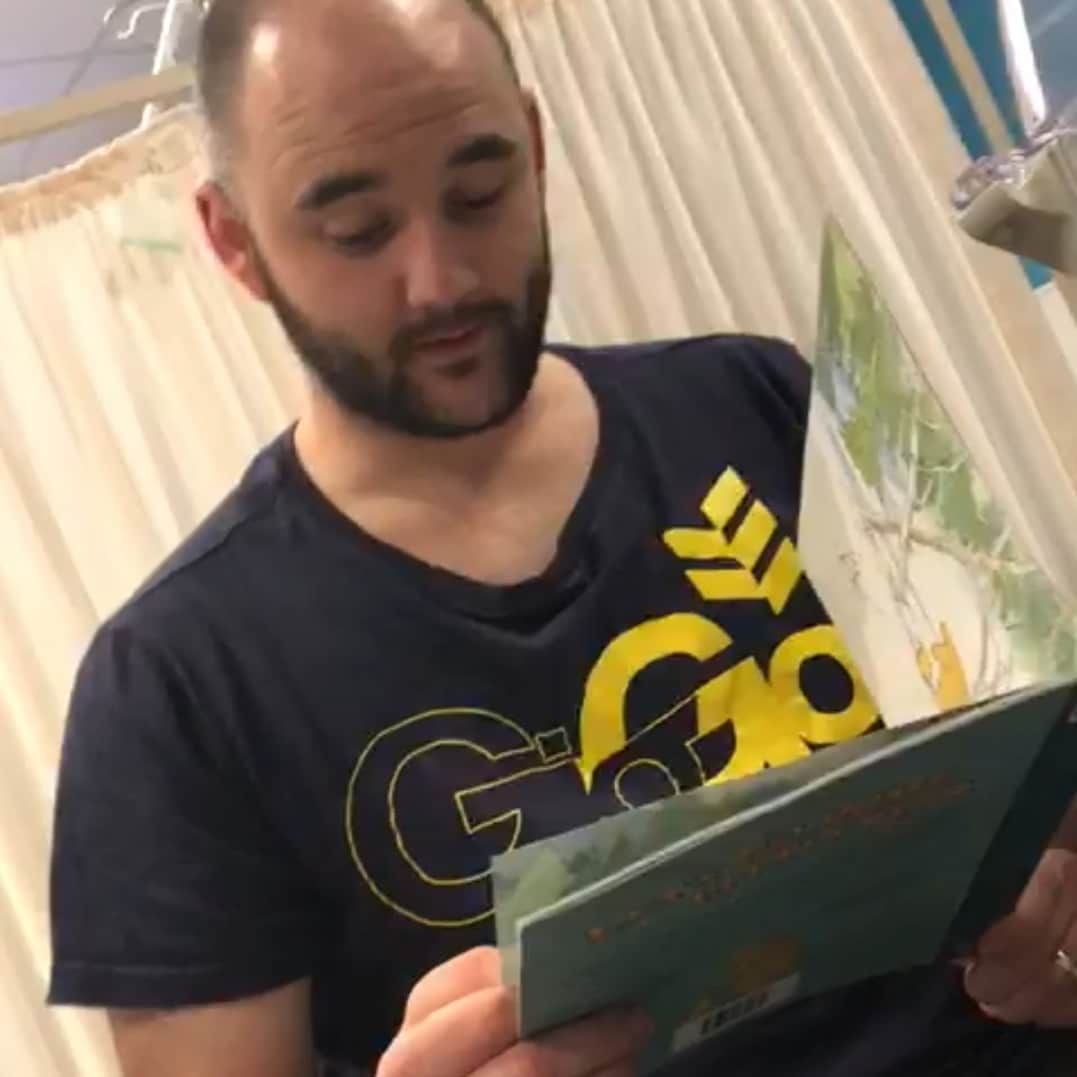One of the best ways I found of bonding with my sons in the neonatal unit was by reading to them.
At the time, it felt almost futile. Here I was, sometimes in a room of other parents, feeling self-conscious about being overheard reading silly rhymes aloud. All while the boys slept (most of the time) through it.
Was there actually any point? As it turns out – yes, there was. Here, I dig deeper into the benefits of reading to your baby in the NICU.
Contents (click to jump to section)
My experience of reading to my children in the NICU
As mentioned, it was an alien feeling to read through a Plexiglass box to my sons. Other times, I read to them while having skin-to-skin, or perhaps while my wife held them. But still, I felt… detached. Like most experiences in this adventure, it was a far cry from what I’d expected and anticipated.
I persevered though, because we were regularly told by nurses that it was a great way to aid the boys’ development. The various reasons included:
- It would help us bond with the boys and feel closer to them
- It would soothe and relax the boys
- It would help with the development of brain connections
- It would help pass the time
- It may take our minds off the stress of the situation
I can say for certain that reading – once I’d shrugged off the thought of being overheard when reading in character – certainly helped my feel closer to the boys. It felt like something I could do that was of use, something that was often hard to come by during the NICU experience.

But was it really helping the boys that much? To find out more, I turned to Twitter for more information – and found it in abundance.
Reading to neonates: what do the experts and studies say?
Middlesbrough Literacy Hub Manager, Allison Potter, kindly shared a wealth of information on the subject of reading to babies in neonatal care.
Since 2013, the hub has been involved in book gifting to neonatal units, which is supported by the publisher Walker. The initiative has been replicated and adapted to units “around the country, including Bradford, Stoke and Scarborough.”
The Middlesbrough unit has also been visited by the authors Joanna Trollope and Adele Parks. who came to see first-hand how the initiative helps with bonding and parental mental health.
I also received further insight from Neonatal and Children’s Occupational Therapist, Elaine McMahon, who said:
Reading to your baby on a neonatal unit is a wonderful opportunity for both baby & parents bonding, communication, occupation and development.”
Elaine McMahon on Twitter
Elaine has co-authored an article on the subject and is passionate about the benefits of reading to neonatal babies.
Nick Embleton, from Neonatal Research, concurred, saying:
“Lovely thing to do and no-brainer that it is good for reader and baby.”
Nick Embleton on Twitter
So, from my experience – and indeed in the opinion of neonatal experts and researchers, the benefits of reading to neonatal babies are clear. Does the science back up these theories?
From my own browsing, and via the above kind-hearted souls who took the time to share them with me, I’ve found a wealth of academic research, studies and whitepapers on the subject.
Study 1) Parental reading = fewer desaturation events
That our babies could feel soothed by our voices seemed bizarre to me, given their traumatic entrance into the world and the physical barrier between us.
Yet studies do support this notion. One such study found that neonatal babies experienced fewer desaturation events (drops in blood oxygen saturation) during and up to an hour after parental reading than before the reading.
Seasoned NICU parents will know all too well the stresses of a ‘desat’, and the panic it can provoke as the machines beep ominously. To know that a parent can contribute to making this type of incident more infrequent is surely of great comfort.
The study concluded:
Voice exposure can be an important way for parents to participate in the care of their preterm infants.
Scala M, Seo S, Lee-Park J, McClure C, Scala M, Palafoutas JJ, Abubakar K. Effect of reading to preterm infants on measures of cardiorespiratory stability in the neonatal intensive care unit. J Perinatol. 2018 Nov;38(11):1536-1541. doi: 10.1038/s41372-018-0198-4. Epub 2018 Aug 17. PMID: 30120423.
Thanks to Allison for sharing this study.
Study 2) Building connections
This paper by Lynne J Walker highlights the benefits to the parents. All too often, parents whose children are in neonatal intensive care find themselves unable to adequately participate or provide parental care.
The paper concludes that reading is a way for parents to feel connected.
Parental reading to infants in the NICU is an intervention that can connect the parent and infant and offers a way for parents to participate in caregiving. This intervention may have many benefits and may positively affect the parent-infant relationship.
Parental reading to infants in the NICU is an intervention that can connect the parent and infant and offers a way for parents to participate in caregiving.
Walker LJ. Bonding with books: the parent-infant connection in the neonatal intensive care unit. Neonatal Netw. 2013 Mar-Apr;32(2):104-9. doi: 10.1891/0730-0832.32.2.104. PMID: 23477977.
This, it’s concluded, may have positive impacts on the parent-infant relationship.
Thanks to Tamsyn Crane and Nicky Crockett who were super-helpful in sharing this paper.
Study 3) Supporting interaction and reading in later childhood
Another study shared by Tamsyn offered insight into the role of reading on parent-infant interaction. The study, by Janice Lariviere and Janet E Rennick, also examined how the habit of reading continued after NICU discharge.
86% of the parents involved in the study felt that reading to their child was enjoyable, with 69% saying it made them feel closer to their baby. Parents involved in the study were also twice as likely to read to their children post-discharge than the control group (discharged before the reading program started).
The study concluded that the results:
support the use of a parent book-reading intervention in the NICU to enhance parent-infant interactions and promote reading.
Lariviere J, Rennick JE. Parent picture-book reading to infants in the neonatal intensive care unit as an intervention supporting parent-infant interaction and later book reading. J Dev Behav Pediatr. 2011 Feb-Mar;32(2):146-52. doi: 10.1097/DBP.0b013e318203e3a1. PMID: 21289497.
How do other parents feel about reading to their NICU babies?
Given my own positive feelings on reading in the NICU, I wanted to find out what other parents thought.
Samuel Wilson, a fellow NICU dad, firmly believes “it works”. He happily shared that his NICU graduate daughter is ahead of her peer reading age, something he is confident was aided by reading to her in the neonatal unit – something that led to him earning the nickname ‘Roald Dahl Dad’.
I was also pointed in the direction of this heartwarming piece, which documents a mother’s thoughts and feelings on how reading to her premature baby helped her bond with her son.
In another extract shared with me by Allison, a mum on a NICU ward shared her thoughts on reading – and how her early reservations soon gave way to focusing on the benefits. Her advice to parents in the neonatal unit? This:
Just do it – you feel stupid at first, you do feel daft
Hannah, a mum of a baby on a neonatal unit
because there are other parents in the room and there is a wall between you but it soothes the baby who can start to understand and know you’re there.
I couldn’t put it better myself.
Public speaking isn’t a strong point or comfortable experience for many people, so reading aloud in a room full of strangers can feel daunting. But I echo Hannah’s advice – try to see the bigger picture and focus on the benefits to your baby.
Laura Anne McKay, part of the fundraising team at Bliss charity, says:
I have a theory that reading to your baby helps with connection and mental health of parents as it’s a “normal” thing you can do for your baby while on the unit even if you can’t cuddle, feed, bath, dress them etc yet.
Laura Anne McKay
She also shared anecdotal evidence that reading helps parents to converse during what is a difficult time:
Looking back… and forward
The consensus is unanimous: reading is important for children’s development. But children born preterm can often experience developmental delays and may even experience social exclusion because of these delays.
The premature birth of our sons was something that shocked and surprised us, but I quickly understood that it was imperative that I do everything in my power to help them – even when I felt helpless.

I’m so glad I ignored the awkwardness of reading aloud in those early hospital days. I sincerely believe it helped my boys to understand who I was, and was able to contribute to their current progress. They’re hitting their milestones and, despite setbacks in the NICU, are in good health and developing well.
Reading is a hobby and routine we’ve religiously kept as parents, and that’s now bearing fruit. Now confidently walking and uttering their first words, both boys love to choose a book to interact with – either looking at pictures alone or bringing them over to me or their mummy to read to them.
I’m an avid reader myself, and for all the things we’ve been through, this trait is one I’m proud to have helped pass on.
